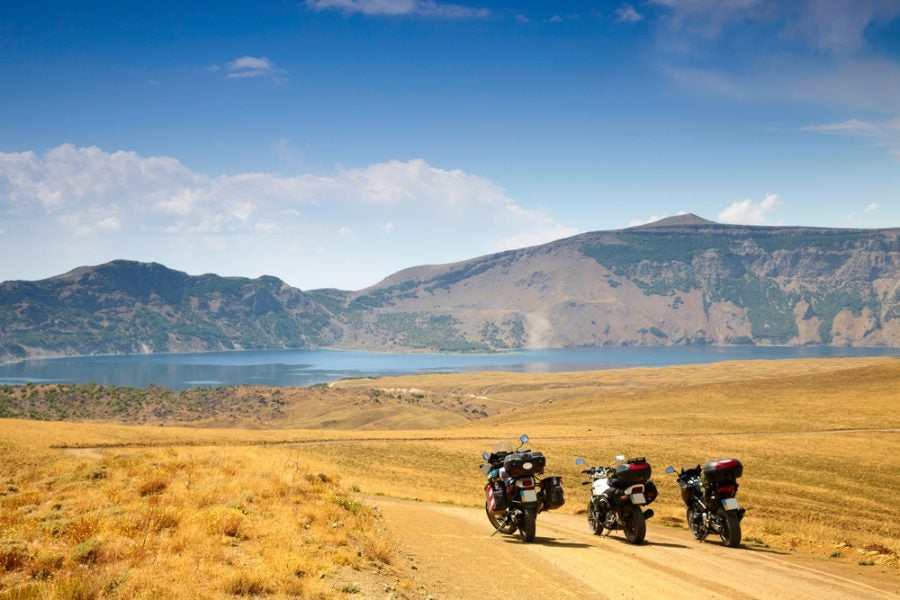In my working life, I’ve had the opportunity to ride hundreds of motorcycles. From blue-chip Vincent Black Shadows to 12-horsepower Honda 125s. From the newest-of-the-new to neglected old bikes—often my neglected old bikes. And this what I’ve learned: today’s motorcycles are better than ever. It’s an irrefutable truth. And it isn’t because I’m ignorant of the charms of old bikes. When it comes to motorcycles, I’m an incurable romantic. One look into my shed would confirm it. But from a machine dynamics point of view, I’d rather straddle a V-Strom than that Vincent. And yet despite the brilliance of modern motorcycles, we seem to be grumpier than ever about the state of motorcycles and motorcycling.
It’s easy to be swept along by the current of discontent. Especially when the byword of our age is intolerance. Societally, we’ve lost the ability to maintain differing views of a subject and yet remain respectful of those whose views don’t match ours. Whether it be in exchanges with colleagues, family, or those with which we share our views online. Negativity rules. And we’re all the lesser for it.
I have an old friend, Karen, the only fellow student from my high-school days I keep in touch with. We are very different people. We’ve lived very different lives. Karen believes in God. Me, not so much. And yet what fun it was a few weeks ago to go with her and her husband Darryl to their little country church. I hadn’t been in a church—aside from weddings—since I was bold enough to confront my mother at age 13 and tell her I was an atheist. That got her attention. And that was the point at which I was released from what I viewed as my Sunday morning misery.
When Karen and Darryl were readying for church, I’d expected that my 18-year-old daughter and I would head back to the city. Yet it was my daughter who said “Dad, let’s go to church.” And I’m glad we did. We stood together with my friends and belted out hymns. We weren’t mocking. Far from it. To me it was a sign of love and respect to share something with people who mean so much to me.
Last winter I had drinks with Zac Kurylyk, the man who runs things around here. After an evening of beer and bullshitting, it was obvious we got along well. It was also obvious that our views of things differed. But how wonderful it was to feel both of us deftly steer clear of topics that would be dead ends. What mattered was respect and friendship. The rest is irrelevant.
Expectation is the thief of joy. And our expectations are all out of whack. We want $5,500 motorcycles that weigh 230 pounds, that cruise effortlessly two-up with luggage at 100 mph, that return 65 miles-per-gallon, and that self-clean. Like an oven. (Now there’s an accessory I could stand behind.) Back to this idea of expectation. And this contradiction: the better bikes have become, the more we expect from them. Indeed, perhaps a degree of dissatisfaction is a human constant. A human default. A human necessity. If we didn’t become dissatisfied, would the relentless cycle of innovation come to an end? Would we still be driving around in Model T Fords and riding eight-horsepower Indian twins with leaf-sprung forks and solid tail ends?
As motorcyclists, and as people living in a time of tumultuous change, we struggle to adapt. None of us are exempt. Nostalgia is the balm to which we turn to protect ourselves from the march of the unknown. Before the industrial revolution, societal change occurred at a glacial pace, but in the past 200 years—which in human-history time is no longer than an eye-blink, we’ve had to deal with unimaginable changes. It’s no wonder men of a certain age listen to Deep Purple instead of Black Mountain. Or Led Zeppelin over Jack White. And I don’t write this with a sneer. I’m as susceptible to the pull of nostalgia as anyone.
My ’90s Ducatis feel like straddling a chainsaw compared to a modern bike. And for reasons that remain murky to me, objects with a degree of mechanical directness appeal to me on a visceral level. I’m also aware that mechanical directness, when you get down to it, is also mechanical unsophistication. I’ve fully-appreciated too many ultra-sophisticated Japanese motorcycles to be immune to their charms. But I can’t help myself, and so my vehicles have manual transmissions, and my espresso machine is 100 pounds of pressure gauges and levers and—ugh—minute internal passageways that become plugged at the least provocation.
At a very young age, I knew I would become a motorcyclist. I had an understanding that it would become part of who I would become. Motorcyclists are iconoclasts. We willingly welcome risk in a risk-averse world. We forsake comfort for visceral experience. But I think we’ve drifted from what motorcycling can teach us. An oblivious, entitled, unobserving motorcyclist isn’t long for this world. And yet isn’t that—as a group—what we’ve become? We blame everything from the Deep State to Chinese operatives to uncomfortable OEM seats for our displeasure. Where is the outsider’s perspective? How did we become so banal? So easily led. So utterly predictable?
Here’s what I’m doing about my role in the malaise. In the past year, I’ve reconnected with many old motorcycling friends I’d drifted from. To a person, I was welcomed back in as if I’d never been away. It was as if each one had been expecting my call. And this, truly, is motorcycling. It’s not the bikes we ride and it’s certainly not the fears we have that someone or something is going to come along a take it away from us. The only people who can put motorcycling at risk is us. By our intolerance. By our rash judgments of others. It’s time for us to expect more from ourselves and from each other.
Best wishes for an invigorating 2024.







